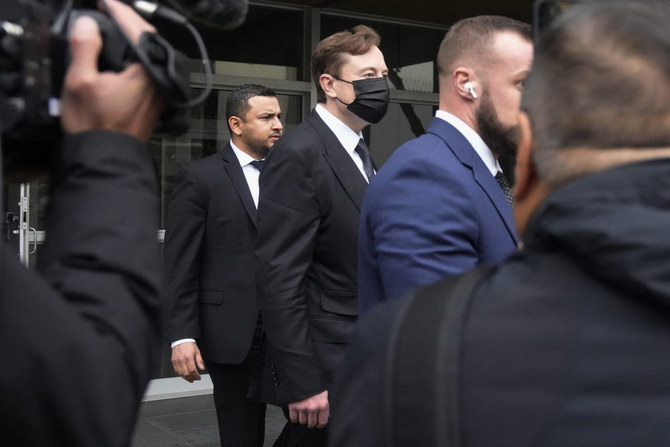SAN FRANCISCO: A US jury on Friday found Tesla Inc. CEO Elon Musk and his company were not liable for misleading investors when Musk tweeted in 2018 that he had “funding secured” to take the electric car company private.
Plaintiffs had claimed billions in damages and the decision also had been seen as important for Musk himself, who often takes to Twitter to air his views.
The jury came back with a unanimous verdict roughly two hours after beginning deliberations.
Musk was not present in court when the verdict was read but soon tweeted that he was “deeply appreciative” of the jury’s decision.
“Thank goodness, the wisdom of the people has prevailed,” he said.
Nicholas Porritt, a lawyer for the investors, said in a statement, “We are disappointed with the verdict and are considering next steps.”
Shares of Tesla rose 1.6 percent in after-hours trading following the verdict.
“A dark chapter is now closed for Musk and Tesla,” Wedbush analyst Dan Ives said. Ives added that some Tesla investors feared Musk might have to sell more Tesla stock if he lost.
The world’s second-richest person has previously created legal and regulatory headaches through his sometimes impulsive use of Twitter, the social media company he bought for $44 billion in October.
Minor Myers, who teaches corporate law at the University of Connecticut and who had previously called the investors’ case strong, called the outcome “astounding.”
The US anti-securities fraud law “has always been thought to be this great bulwark against misstatements and falsehoods,” he said. “This outcome makes you wonder if it is up to the job in modern markets,” he said, adding that Musk himself was likely to “double down” on his communication tactics after the verdict.
Musk’s attention has been divided in recent months between Tesla, his rocket company SpaceX and now Twitter. Tesla investors have expressed concerns that running the social media company has taken up too much of his focus.
’Bad word choice’
Tesla shareholders claimed Musk misled them when he tweeted on Aug. 7, 2018, that he was considering taking the company private at $420 per share, a premium of about 23 percent to the prior day’s close, and had “funding secured.”
They say Musk lied when he tweeted later that day that “investor support is confirmed.”
The stock price soared after the tweets and then fell again after Aug. 17, 2018, as it became clear the buyout would not happen.
Porritt during closing arguments said the billionaire CEO is not above the law, and should be held liable for the tweets.
“This case ultimately is about whether rules that apply to everyone else should also apply to Elon Musk,” he said.
Musk’s lawyer Alex Spiro countered that Musk’s “funding secured” tweet was “technically inaccurate” but that investors only cared that Musk was considering a buyout.
“The whole case is built on bad word choice,” he said. “Who cares about bad word choice?“
“Just because it’s a bad tweet doesn’t make it fraud,” Spiro said during closing arguments.
An economist hired by the shareholders had calculated investor losses as high as $12 billion.
During the three-week trial, Musk spent nearly nine hours on the witness stand, telling jurors he believed the tweets were truthful.
Musk later testified that he believed he could have sold enough shares of his rocket company SpaceX to fund a buyout, and “felt funding was secured” with SpaceX stock alone.
Musk testified that he made the tweets in order to put small shareholders on the same footing as large investors who knew about the deal. But he acknowledged he lacked formal commitments from potential backers.
The verdict is another victory for Musk and his lawyer Spiro after they won a defamation lawsuit against the billionaire in 2019 over his tweet calling a cave explorer a “pedo guy.”
Tesla’s Elon Musk found not liable in trial over 2018 ‘funding secured’ tweets
https://arab.news/cqwjw
Tesla’s Elon Musk found not liable in trial over 2018 ‘funding secured’ tweets

- Tesla shareholders claimed Musk misled them when he tweeted on Aug. 7, 2018, that he was considering taking the company private at $420 per share
- Shares of Tesla rose 1.6 percent in after-hours trading following the verdict and Musk tweeted that "he wisdom of the people has prevailed"
WhatsApp says Russia ‘attempted to fully block’ app

- Moscow has been trying to nudge Russians to use a more tightly controlled domestic online service
SAN FRANCISCO, United States: WhatsApp said Wednesday that Russia “attempted to fully block” the messaging app in the country to push users to a competing state-controlled service, potentially affecting 100 million people.
Moscow has been trying to nudge Russians to use a more tightly controlled domestic online service.
It has threatened a host of Internet platforms with forced slowdowns or outright bans if they do not comply with Russian laws, including those requiring data on Russian users to be stored inside the country.
“Today the Russian government attempted to fully block WhatsApp in an effort to drive people to a state-owned surveillance app,” WhatsApp posted on X.
“Trying to isolate over 100 million users from private and secure communication is a backwards step and can only lead to less safety for people in Russia,” WhatsApp added.
“We continue to do everything we can to keep users connected.”
Critics and rights campaigners say the Russian restrictions are a transparent attempt by the Kremlin to ramp up control and surveillance over Internet use in Russia, amid a sweeping crackdown on dissent during the Ukraine offensive.
That latest developments came after Russia’s Internet watchdog said Tuesday it would slap “phased restrictions” on the Telegram messaging platform, which it said had not complied with the laws.














